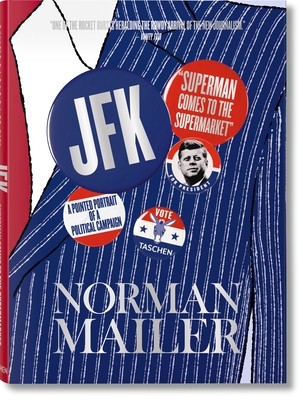
- Mēs nosūtīsim 10-14 darba dienu laikā.
- Autors: Norman Mailer
- Izdevējs Taschen
- Gads: 2014
- Lapas: 370
- ISBN-10 : 3836550334
- ISBN-13 : 9783836550338
- Formāts: 39.9 x 50.3 x 8.4 cm, kieti viršeliai
- Valoda: Anglų
- Extra -10% atlaide, ievadot kodu: EXTRA
Norman Mailer. Jfk. Superman Comes to the Supermarket + bezmaksas piegāde! | Bookbook.lv
Atsauksmes
Apraksts
With his Hollywood good looks, boundless enthusiasm, and mesmeric media presence, John F. Kennedy was destined to capture the imaginations of the more than 70 million Americans who watched the nation's first televised presidential debate. Just days after beating out Richard Nixon by the narrowest margin in history, Kennedy himself said, "It was the TV more than anything else that turned the tide."
But one man begged to differ: writer Norman Mailer, who bragged that his pro-Kennedy treatise, "Superman Comes to the Supermarket," had "won the election for Kennedy." The article, published in Esquire magazine just weeks before polls opened, redefined political reporting with Mailer's frank, first-person voice identifying Kennedy as the "existential hero" who could awaken the nation from its postwar slumber and conformist Eisenhower years. Both Kennedy and New Journalism had arrived.
Now, TASCHEN reimagines and interprets this no-holds-barred portrait of Kennedy on his path to the White House, publishing Mailer's essay in book form alongside 300 photographs that bring the campaign and the candidate's family to life. These images were captured by some of the great photojournalists of the day--including Cornell Capa, Henri Dauman, Jacques Lowe, Lawrence Schiller, Paul Schutzer, Stanley Tretick, Hank Walker, and Garry Winogrand--providing a fascinating look at the man who declared the '60s "a time for greatness."
10 EXTRA % atlaide
Kupona kods: EXTRA
Akcija beidzas 7d.05:36:38
Atlaides kods derīgs pirkumiem no 10 €. Atlaides nav kumulatīvas.
Derīgs tikai pirkumiem tiešsaistē.

- Autors: Norman Mailer
- Izdevējs Taschen
- Gads: 2014
- Lapas: 370
- ISBN-10: 3836550334
- ISBN-13: 9783836550338
- Formāts 39.9 x 50.3 x 8.4 cm, kieti viršeliai
- Valoda: Anglų
With his Hollywood good looks, boundless enthusiasm, and mesmeric media presence, John F. Kennedy was destined to capture the imaginations of the more than 70 million Americans who watched the nation's first televised presidential debate. Just days after beating out Richard Nixon by the narrowest margin in history, Kennedy himself said, "It was the TV more than anything else that turned the tide."
But one man begged to differ: writer Norman Mailer, who bragged that his pro-Kennedy treatise, "Superman Comes to the Supermarket," had "won the election for Kennedy." The article, published in Esquire magazine just weeks before polls opened, redefined political reporting with Mailer's frank, first-person voice identifying Kennedy as the "existential hero" who could awaken the nation from its postwar slumber and conformist Eisenhower years. Both Kennedy and New Journalism had arrived.
Now, TASCHEN reimagines and interprets this no-holds-barred portrait of Kennedy on his path to the White House, publishing Mailer's essay in book form alongside 300 photographs that bring the campaign and the candidate's family to life. These images were captured by some of the great photojournalists of the day--including Cornell Capa, Henri Dauman, Jacques Lowe, Lawrence Schiller, Paul Schutzer, Stanley Tretick, Hank Walker, and Garry Winogrand--providing a fascinating look at the man who declared the '60s "a time for greatness."

Atsauksmes